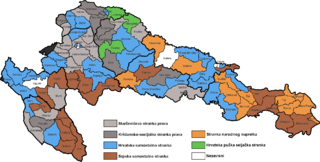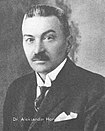Croatian parliamentary election, 1913
|
|
|||||||||||||||||||||||||||||
|---|---|---|---|---|---|---|---|---|---|---|---|---|---|---|---|---|---|---|---|---|---|---|---|---|---|---|---|---|---|
|
|||||||||||||||||||||||||||||
|
88 seats to the Sabor |
|||||||||||||||||||||||||||||
| Turnout | 53.27% | ||||||||||||||||||||||||||||
|
|||||||||||||||||||||||||||||

Results of the election in each of the electoral districts in 8 counties of the Kingdom of Croatia-Slavonia: the party with the plurality of votes in each district.
Starčević's Party of Rights Christian-Social Party of Rights Croatian Independent Party Serb Independent Party Unionists Croatian Peoples' Peasant Party Independent |
|||||||||||||||||||||||||||||
Croatian parliamentary elections were held on 16 and 17 December 1913. There were 209,618 eligible male voters. According to the census of December 31, 1910, the Kingdom of Croatia-Slavonia had a population of 2,621,954.
The Croatian parliament had been dissolved by ban Slavko Cuvaj on 27 January 1912. On April 4 Cuvaj suspended the constitution and the following day was proclaimed commissioner of the Kingdom. Over the course of the following year two assassination attempts were made on Cuvaj, leading to his withdrawal as commissioner. Ivan Skerlecz was proclaimed ban on November 27, 1913 and called elections for 16 and 17 December.
...
Wikipedia



